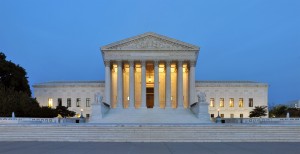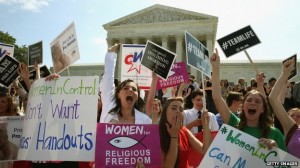 On March 25, the Supreme Court heard arguments regarding challenges to the contraception mandate of the Affordable Care Act, with a decision expected to come down in late June. Here’s a rundown of the main aspects of this important case:
On March 25, the Supreme Court heard arguments regarding challenges to the contraception mandate of the Affordable Care Act, with a decision expected to come down in late June. Here’s a rundown of the main aspects of this important case:
What is being challenged?
Under the contraception mandate in the Affordable Care Act, employers are required to provide employees with comprehensive health insurance, including a range of contraceptive methods for women. Organizations exempt from this mandate include small employers that are not required to provide any health insurance to employees, religious organizations and organizations with select insurance plans that were grandfathered in. Religiously-affiliated non-profit organizations may request exemptions as well. The main issue being decided is whether for-profit organizations can choose not to cover contraceptive care in health insurance plans based on religious objections. This comes down to the scope of the Religious Freedom Restoration Act of 1993 (RFRA), which currently does not apply to for-profit corporations.
Who is challenging the law?
The cases were brought by two for-profit corporations, that while not religious or religiously-affiliated, claim to operate based on religious principles. The corporations are Hobby Lobby, a craft store chain based in in Oklahoma City and owned by a Christian family, and Conestoga Wood Specialties, a Pennsylvania-based company that makes wood cabinets and is owned by a Mennonite family.
Why is the law being challenged?
The corporations challenging the contraception mandate believe that certain forms of birth control drugs and devices, including the morning after pill and IUDs, are equivalent to abortion because they may prevent embryos from implanting in the uterus. As such, they believe that covering the cost of these forms of contraception makes the them complicit with abortion. The corporations do not oppose all forms of birth control, including condoms, diaphragms, sponges, certain drugs and sterilization.
How is the administration defending the law?
Donald B. Verrilli, Jr., the current solicitor general who is representing the U.S. administration, has stated that the law offering comprehensive contraceptive care to women promotes public health and ensures equal access to healthcare for women. He also emphasized that it should be doctors, not employers, who should decide the best form of contraception for women. Additionally, a brief from the Guttmacher Institute points out that many women cannot afford highly effective forms of birth control, and so upholding the law will reduce unplanned pregnancy and abortions.
What are the potential outcomes and implications of the decision?
There are many ways the decision could go, each with varying repercussions. If the Supreme Court decides the RFRA does not cover for-profit organizations, it will end those organizations’ ability to challenge the contraception mandate based on religious beliefs. The Supreme Court could decide the RFRA does apply to for-profit organizations, but still rule on the side of the administration. This would be a less decisive win for the administration that would likely lead to more challenges. If the Supreme Court rules in favor of Hobby Lobby and Conestoga Wood Specialties, it will impact women’s access to affordable birth control, while opening the door to other religious objections raised by employers, such as hiring gay and lesbian individuals, or offering benefits to same sex spouses.
For more information, see the sources below:
Liptak, Adam. "Supreme Court Hears Cases on Contraception Rule." The New York Times. 25 March 2014.
Totenberg, Nina. "Supreme Court Justices Divide by Gender in Hobby Lobby Contraception Case." NPR. 25 March 2014.
Fuller, Jaime. "Here's What You Need to Know About the Hobby Lobby Case." The Washington Post. 24 March 2014.
"Health Care Law's 'Contraception Mandate' Reaches the Supreme Court." Pew Research: Religion and Public Life Forum. 20 March 2014.

 Yesterday, in a 5-4 decision, the Supreme Court ruled that “requiring family-owned corporations to pay for insurance coverage for contraception under the Affordable Care Act violated a federal law protecting religious freedom.” Justice Samuel A. Alito Jr. conceded that the government does have a “compelling interest in making sure women have access to contraception,” but that there are ways of providing that access without “violating the companies’ religious rights.”
Yesterday, in a 5-4 decision, the Supreme Court ruled that “requiring family-owned corporations to pay for insurance coverage for contraception under the Affordable Care Act violated a federal law protecting religious freedom.” Justice Samuel A. Alito Jr. conceded that the government does have a “compelling interest in making sure women have access to contraception,” but that there are ways of providing that access without “violating the companies’ religious rights.” Geneticists, researchers, and patients joined in celebration over last week’s unanimous Supreme Court ruling involving the BRCA1 and BRCA2 genes, colloquially referred to as the “breast cancer genes.” The Supreme Court ruled that Myriad Genetics could not patent the BRCA1 and BRCA2 sequence of genes, because patents cannot be placed on that which is created organically in nature. This decision opens the door for researchers outside of Myriad Genetics to study these genes, providing more opportunities to discover early signs of breast cancer susceptibility. Karuna Jaggar, Breast Cancer Action’s Executive Director reported that this ruling was, “a tremendous victory for women with a known or suspected inherited risk of breast cancer. Today, the Court righted a wrong and has put patients’ health before corporate profits.”
Geneticists, researchers, and patients joined in celebration over last week’s unanimous Supreme Court ruling involving the BRCA1 and BRCA2 genes, colloquially referred to as the “breast cancer genes.” The Supreme Court ruled that Myriad Genetics could not patent the BRCA1 and BRCA2 sequence of genes, because patents cannot be placed on that which is created organically in nature. This decision opens the door for researchers outside of Myriad Genetics to study these genes, providing more opportunities to discover early signs of breast cancer susceptibility. Karuna Jaggar, Breast Cancer Action’s Executive Director reported that this ruling was, “a tremendous victory for women with a known or suspected inherited risk of breast cancer. Today, the Court righted a wrong and has put patients’ health before corporate profits.” The Supreme Court's decision to uphold the health care law (Affordable Care Act) will keep in place important benefits to women:
The Supreme Court's decision to uphold the health care law (Affordable Care Act) will keep in place important benefits to women: